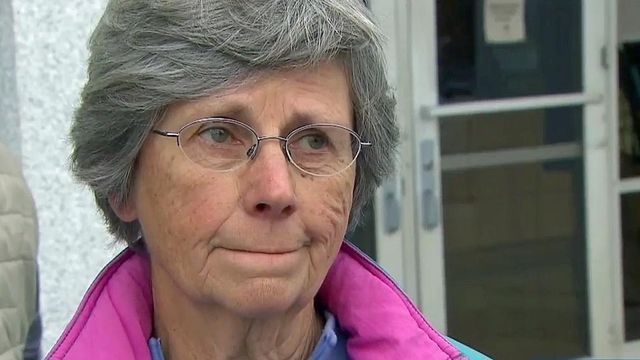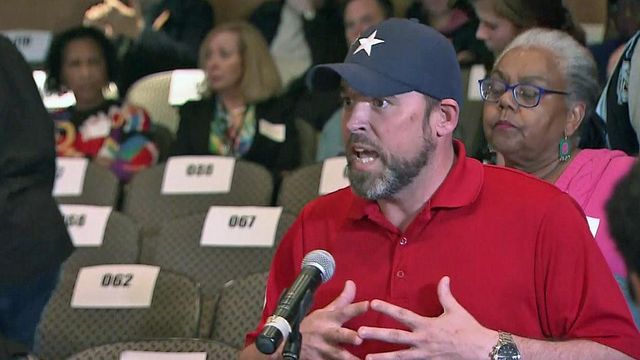Most speakers oppose moving Confederate monuments
Despite the occasional "traitor" or "communist" or "human debris," a mostly civil conversation is held on what to do with Confederate monuments at the Capitol.
Posted — UpdatedAbout 60 people spoke, much fewer than expected by the study committee considering this issue for the state Historical Commission. In fact, a hearing slated for two hours, with a third hour optional, basically wrapped up after one. Committee members sat around for an hour waiting to see if anyone else would show up to speak before the hearing's advertised 3:30 p.m. end.
No one did.
Chairman David Ruffin said the group hopes to make a recommendation to the Historical Commission by mid-May, but first it plans to take a closer look at legal opinions and input from various experts about exactly what it can do on Confederate monuments under state law.
Gov. Roy Cooper wants to move three monuments from outside the Capitol building to the Battle of Bentonville site in Johnston County. The General Assembly's Republican majority passed legislation in 2015 that says the Historical Commission has to approve such moves, but that law also says monuments can be moved only when required to preserve them or when removal is needed to make room for construction.
A number of speakers Wednesday said the law is clear: The monuments can't be moved to Bentonville, in part because the law also requires monuments to be relocated "to a site of similar prominence, honor, visibility, availability, and access."
WRAL News streamed the hearing and produced a live blog of many of the comments. That rundown is below, in reverse chronological order.
One man said the timing of their placement was key – long after the war was over and during the Jim Crowe era.
"I think it is hard to ignore their racist past," he said.
"These monuments are a mask," one woman said. "They are a whitewash over my ancestors' cowardice or inhumanity."
"When I walk past the monuments, they turn my stomach," another woman said. "There should be no monuments for traitors."
And one man noted that the Confederate flag had become a symbol for neo-Nazis and the KKK.
"Until (those who want the monuments to remain) take their heritage back, I don' think they have much to say," he said.
We fought the war "for Southern independence ... against an overbearing government," Rusty Alphin said. "We're fighting that war again today."
As he said this, a pair of black women in the audience snickered a bit, looked at each other and shook their heads.
Charles Lane of Raleigh would like to see them moved, though.
"We, as North Carolinians, must address the implications of our history," he said. "It is arrogant of us to honor a rebellion with the tallest statue on the Capitol grounds."
Lane was followed by Mark Sweat, who criticized the "criminal leftists and the shreds of human debris that follow them" who want these monuments moved. He called Cooper "the Neville Chamberlain of our time." Chamberlain was the British prime minister who sought to keep Great Britain out of World War II by appeasing Adolf Hitler.
He was followed by Dennis Johnson, who introduced himself as, "just a regular redneck from Johnston County." He is against moving the monuments.
"I can't believe we've got a governor that would even consider that," he said.
Ruffin also spoke briefly about the committee's next step. It's essentially to think about whether to move the three monuments at issue and to consider legal advice about just what power the state Historical Commission, which this study committee is attached to, has. State legislators passed a law in 2015 to protect Confederate and other monuments from removal, and there's some question whether the commission is empowered to order removal.
The first speakers are lining up, and the hearing will get rolling in a moment.
Seats reserved for speakers are about half full, with about 55 people signed up to speak. Attendance is far below the commission's meeting on the issue last fall, during which committee members decided to delay any decision on Confederate monuments on the Capitol grounds until this year.
That meeting drew a packed house and protests outside. None of that is in evidence now.
Related Topics
• Credits
Copyright 2024 by Capitol Broadcasting Company. All rights reserved. This material may not be published, broadcast, rewritten or redistributed.






